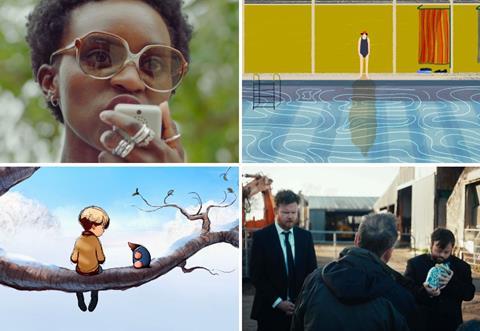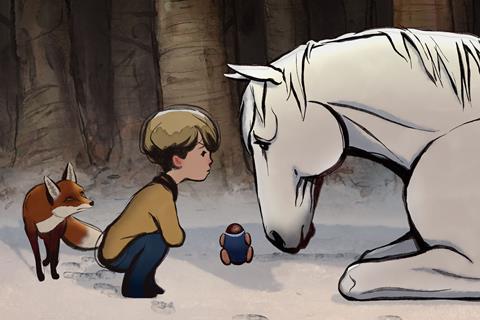The films competing in the two shorts categories at the Baftas vary from a personal project about fighting depression to an Apple‑backed bestseller adaptation. Screen profiles the eight titles vying for the opt-in chapter’s votes:

British short film
The Ballad Of Olive Morris
Bafta nominee: Alex Kayode-Kay (writer/director/producer)
Filmmaker and actor Alex Kayode-Kay (TV comedy pilot The Solution) knocked on doors in Brixton, south London in 2021 to persuade residents to crowdfund his script about little-known civil and housing rights activist Olive Morris, having come across her story while living there in 2016. It is based on a true-life incident in 1969 that saw 17-year-old Morris try to prevent a Nigerian diplomat from being assaulted by police in Brixton. “An activist since her teens, she put herself in danger to fight for various causes and died [at] only 27,” says Kayode-Kay. He pledged to make a narrative film about her.
Following three days of filming in Brixton in October 2021, post-production took three months before The Ballad Of Olive Morris debuted on the festival circuit in July 2022. “Being Black and British, the relative obscurity of Morris’s story weighed heavily on me,” he says. “I lived with it for six years before the world got to see it as I saw it in my head.”
Bazigaga
Bafta nominees: Jo Ingabire Moys (writer/director), Stephanie Charmail (producer)
Rwandan-UK debut director Jo Ingabire Moys filmed Bazigaga on Réunion island, the French territory east of Madagascar, during lockdown in 2020, “purely for logistical reasons”. Set in Rwanda in 1994 against the backdrop of the genocide, Bazigaga — which had its first film festival outings at Rhode Island and Angouleme in France — tells the story of a pastor and his daughter who are hunted by militias and take shelter with the feared titular shaman, played by Eliane Umuhire. Thanks to co-production from France’s Fulldawa Films, filming in a French territory meant access to an experienced crew despite a limited budget, explains Moys. Shot over four days, the dialogue is in the Bantu language Kinyarwanda, rendering it “as true to the story as possible”.
One of the most challenging moments was filming a drowning scene. “We created a well and ensured it was very safe, but convincing an eight-year-old first-time actor that we would not actually drown her was a challenge,” says Moys. “In the end, though, she was very brave and delivered a brilliant performance.”
Bus Girl
Bafta nominees: Jessica Henwick (writer/ director), Louise Palmkvist Hansen (producer)
Marking actress Jessica Henwick’s directing debut, Bus Girl details the story of an aspiring young female chef as she navigates the cutthroat world of high-end cooking. Henwick conducted pre-production remotely, using FaceTime to speak with producer Louise Palmkvist Hansen and DoP Nick Cooke, because she was filming Glass Onion: A Knives Out Mystery in Greece and Serbia (as the long-suffering assistant to Kate Hudson’s character) and it was peak pandemic in London. “If any of us had tested positive, it would have been an incredible mess for both films. Netflix didn’t release me until a few hours before my flight, just in case. Thankfully it went smoothly after that.”
The film was shot on location at a central London restaurant across three days, and produced by the UK’s Emu Films; Henwick stepped in to play the lead after losing her actress just before filming. “Everyone on set was blown away with how organically Jess switched hats from directing to acting,” says Hansen. “She was so switched-on and had such a clear vision for both the film and character, which really comes to life on screen.” Adds Henwick: “Bonus points to the day where we had 15 minutes to film the climax and it started raining.”
A Drifting Up
Bafta nominee: Jacob Lee (director)
An artist working in film, Jacob Lee’s debut short A Drifting Up is an intimate and personal portrait of depression and the road to recovery, armed only with a boombox, dance and interactions with strangers.
Having filmed over two months in London and Bristol, Lee spent eight months editing 100-plus hours of footage down to 10 minutes. The film — which has shown at Aesthetica Short Film Festival and Leeds International Film Festival — documents a man (played by Lee) who dances his way through the six weeks it takes to come off anti-depressants on the streets. “It’s obviously a very personal film,” he says. “While it’s about my own struggle with depression, I hope people can relate to it in some way.”
Lee took inspiration from Scottish artist Richard Demarco, who had suggested that the true motivation for any artist is to try and express the feeling of being overwhelmed by their life.
“The most challenging moment was definitely the edit. It took two months to watch all of the footage through just once,” Lee says. “When you’re depressed, it’s very hard to look at videos of yourself dancing for hours on end.”
An Irish Goodbye
Bafta nominees: Tom Berkeley, Ross White (writers/directors)
The second short from co-writer/ director duo Tom Berkeley and Ross White, Northern Ireland Screen-backed An Irish Goodbye is a step up in ambition. Their debut Roy was filmed in one room with a single actor, while An Irish Goodbye is shot on location at working farms and the landscapes of Northern Ireland. The film follows two estranged brothers (played by Seamus O’Hara and James Martin) forced to reunite following the death of their mother, when they discover her unfulfilled bucket list. Michelle Fairley provides the mother’s crucial off-camera voiceover.
There was no wiggle room in the production schedule, shot over four-and-a-half days. That said, somewhere there is a generous amount of footage of the lead actors dancing.
“There’s a three-second shot of Seamus and James dancing around a room with strobe lighting in fluorescent Lycra,” says Berkeley. “It started off as a locked-off shot, then they started throwing out rogue dance moves.” The whole crew was hypnotised. “The editor wanted to know why there was a 25-minute rave sequence when we got to edit,” smiles White. Following the Bafta nod, the news got even better — with An Irish Goodbye also nominated for best short film at Oscar.
British short animation

The Boy, The Mole, The Fox And The Horse
Bafta nominees: Peter Baynton, Charlie Mackesy (directors), Cara Speller, Hannah Minghella (producers)
Bringing Charlie Mackesy’s 2019 illustrated book The Boy, The Mole, The Fox And The Horse to animated life was an onerous task for a slew of different reasons, not least the responsibility of doing the bestseller justice to its legions of fans.
The Apple Originals/BBC-backed hand-drawn film — streaming now on BBC iPlayer and Apple TV+ — details the story of a lost boy (voiced by newcomer Jude Coward Nicoll) trying to find his way home in a snow-covered landscape with the help of a mole (Tom Hollander), fox (Idris Elba) and horse (Gabriel Byrne). “His work is so beautiful, you want to do that justice,” says Baynton (animated shorts Over The Hill and Save Our Bacon), who co-directed with Mackesy from an adaptation penned by Jon Croker. “The book is such a phenomenon, I feel like it’s not just Mackesy’s work. It’s become the property of millions of people, in some way.”
From script development to screen, it took the team — including creative producers Matthew Freud, Cara Speller, Hannah Minghella and JJ Abrams — two years to bring the book to animated life. The film’s bonus reward: an Oscar nomination for animated short.
Middle Watch
Bafta nominees: John Stevenson (writer/director), Aiesha Penwarden (co-director), Giles Healy (producer)
Los Angeles-based UK-US director John Stevenson (Kung Fu Panda) met Giles Healy in Falmouth, UK in 2018 after Stevenson delivered a talk at the School of Film and Television. Stevenson pitched Middle Watch, a long-standing passion project, over dinner: the animation follows a sailor who serves as lookout in the hallucinatory small hours of the morning — scanning for enemy aircraft and submarine torpedo attacks and a chance encounter with a creature of the deep. Falmouth graduate Aiesha Penwarden started out on the university-based project as a storyboarder before upping her responsibilities to co-direct, with Middle Watch heralding her first film.
“John encouraged one and all to share ideas and build on the film’s foundational framework,” she says. “This gave me the drive and freedom I needed to push and challenge the visual styling, character arc and emotional beats to complement the film’s original intent.” Healy pulled it together despite budgetary constraints, co-ordinating students across the UK and Europe over the three years of Covid-impacted production.
Your Mountain Is Waiting
Bafta nominees: Hannah Jacobs (director), Harriet Gillian (writer), Zoe Muslim (producer)
Hannah Jacobs (credits include animations for pop videos and commercial projects) and Harriet Gillian (animator on Mr Bean: The Animated Series) met at She Drew That, a network created in 2019 to connect and develop the careers of female directors and animators.
The pair teamed up for what would become Your Mountain Is Waiting, working on a script and treatment to apply for the BFI short form animation fund; they were steered by Zoe Muslim of Passion Pictures’ animation division Strange Beast. Billed as a story about intuition, the film uses hand-illustrated animations and painterly textures to explore how it feels to have lost the feeling, and the curious ways to learn how to trust instincts again. It secured BFI backing in 2020, just as the lockdown hit.
“The whole film was made remotely with production meetings in the park,” says Muslim. The film took two years to make from concept to screen, and went on to play at more than 15 festivals. While Jacobs and Gillian had never worked together, they discovered “a very organic way of collaborating and were very much in sync” from the get-go, the pair say.
“Collaboration is the best of any creative project and this was truly that from our first meet-up to delivering the final film,” they add.















![[L-R]: Amanda Villavieja, Laia Casanovas, Yasmina Praderas](https://d1nslcd7m2225b.cloudfront.net/Pictures/274x183/6/4/1/1471641_pxl_20251224_103354743_618426_crop.jpg)



![[L-R]: Amanda Villavieja, Laia Casanovas, Yasmina Praderas](https://d1nslcd7m2225b.cloudfront.net/Pictures/100x67/6/4/1/1471641_pxl_20251224_103354743_618426_crop.jpg)





No comments yet